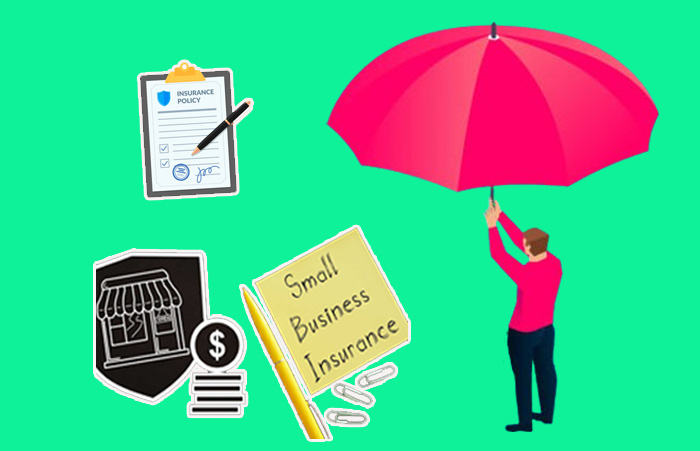Proper protection is crucial for small businesses to thrive. In today’s litigious society, having the right safeguards in place is a must. Small business liability insurance is vital for risk management. Small businesses drive our economy, but they face various risks that could harm them. Liability insurance shields them from legal and financial troubles arising from claims like bodily injury or property damage.

Understanding liability insurance can be overwhelming for small business owners. But it’s crucial for responsible ownership. This guide offers clarity and insights to empower owners in making informed decisions for their enterprises.
What is Small Business Liability Insurance?
Small business liability insurance shields businesses from financial losses due to liability claims. These claims might stem from bodily injury, property damage, or other legal obligations. The insurance covers legal costs, medical expenses, and damages from these incidents.
Why is Small Business Liability Insurance Essential?
- Risk Mitigation: Business involves risks, and even small errors can mean big financial hits. Liability insurance acts as a safety net, offering protection from unexpected events that could harm the business’s financial stability.
- Financial Protection: Even small businesses face costly legal battles. Without liability insurance, these fights can drain a company’s finances and even threaten its survival. Lawsuits bring hefty expenses like legal fees, settlements, and judgments, putting a huge financial strain that could bankrupt a small business.
- Personal Liability of Business Owners: Small business owners, especially sole proprietors and partners, risk personal liability without proper insurance. Without liability coverage, their assets like homes, savings, and investments could be in jeopardy if sued. This puts not just the business but the owner and their family at risk of devastating consequences.
- Employee-related Claims: Employment-related claims, including wrongful termination, discrimination, or harassment suits, can be detrimental to small businesses without liability insurance. Legal costs to defend against these claims and potential settlements can strain the financial viability of the business, leading to operational disruptions and reputational damage.
- Third-Party Claims: In the absence of liability insurance, small businesses are vulnerable to property damage claims or lawsuits filed by third parties. Accidents, negligence, or faulty products/services can result in costly property repairs, medical expenses, or legal settlements. Lacking sufficient insurance, small businesses may struggle to handle these unpredictable expenses.
Types of Small Business Liability Insurance
Exploring small business liability insurance involves grasping its coverage areas and claim types. It shields businesses from risks and liabilities, offering financial protection against legal claims or lawsuits. Let’s explore the key coverage areas and types of claims covered by small business liability insurance:
General Liability Insurance: This is fundamental for protecting small businesses from common risks.
Coverage Areas:
- Bodily Injury: If a customer or third party sustains physical harm on your business premises.
- Property Damage: Protection against damage caused to the property of others by your business operations.
- Advertising Injury: Coverage for claims of defamation, copyright infringement, or misleading ad.
Professional Liability Insurance: Also called errors and omissions (E&O) insurance, protects businesses offering professional services or advice from claims of negligence or inadequate service.
Coverage Areas:
- Professional Negligence: Protection against claims arising from errors, omissions, or negligence in your professional services.
- Legal Fees: Coverage for legal expenses incurred in defending against claims of professional misconduct.
Product Liability Insurance: It protects businesses involved in manufacturing, distributing, or selling products from liabilities related to defects, malfunctions, or inadequate warnings.
Coverage Areas:
- Manufacturing Defects: Protection against claims due to defects in the design or manufacturing of products.
- Marketing Defects: Coverage for claims related to improper labeling, inadequate instructions, or warnings.
- Product Malfunction: Financial protection in case your product causes harm or injury to consumers.
Cyber Liability Insurance: In our digital world, cyber liability insurance guards against data breaches, cyberattacks, and other online risks.
Coverage Areas:
- Data Breach: Financial coverage for expenses linked to data breaches, such as customer notifications and credit monitoring services.
- Cyber Extortion: Protection against ransomware attacks and demands for cyber extortion.
- Data Loss: Coverage for costs involved in data recovery and restoration.
Commercial Property Insurance: Commercial property insurance safeguards a business’s physical assets, like buildings, equipment, inventory, and furniture, from risks such as fire, theft, vandalism, and natural disasters.
Coverage Areas:
- Building Damage: Financial protection for damage to your business premises’ physical structure.
- Business Interruption: Coverage for lost income and operational expenses while restoring the property.
- Equipment Protection: Safeguards essential equipment crucial for business operations.
Understanding the Role of Liability Insurance
Small business liability insurance is a key tool for managing risks, offering financial protection against legal claims and damages arising from business operations. It includes various coverage types, like general liability and professional liability insurance, tailored to address specific risks and scenarios businesses may face.
Real-world Scenarios:
- Slip-and-Fall Accident: Picture a customer slipping on a wet floor in your retail store. Without liability insurance, your business could face a lawsuit for their injuries. Small business liability insurance would cover legal expenses and potential settlements, safeguarding your assets from such incidents.
- Product Liability Claims: Imagine a customer claiming harm from a defective product your small manufacturing business sold. Product liability insurance in your small business policy would cover legal defense costs, settlements, or judgments, protecting your business financially from product-related issues.
- Professional Errors: If your small consulting firm inadvertently gives incorrect advice leading to client financial losses, professional liability insurance (errors and omissions insurance) would cover legal costs for defending against negligence claims.
- Property Damage: Suppose a fire damages neighboring businesses from your small restaurant. Property damage liability coverage in your policy would help with repair or replacement costs, shielding your business from financial fallout.
- Employee Injuries: If an employee gets hurt at work, workers’ compensation insurance covers medical expenses and lost wages, fulfilling legal requirements and protecting your business from related lawsuits.
- Data Breach: With rising cyber threats, small businesses are vulnerable to data breaches. Cyber liability insurance can cover breach costs like customer notifications, credit monitoring, and potential legal fees from resulting lawsuits.
Insights into Working with Small Business Liability Insurance Providers
- Personalized Guidance: Insurance professionals provide tailored guidance for your business needs. They evaluate risks, suggest appropriate coverage, and support you throughout.
- Access to Expertise: Agents offer industry expertise, simplifying complex insurance terms for clarity. They explain policy details, exceptions, and coverage limits.
- Claims Assistance: Trusted providers assist with claims, ensuring a smooth process during tough times. They advocate for you to speed up resolutions.
Comparing Quotes for Small Business Liability Insurance
- Multiple Quotes: Gathering quotes from different insurers enables comparison of coverage and prices, helping find the most cost-effective option while ensuring essential coverage.
- Policy Customization: Compare quotes to explore varied coverage options. Seek customizable policies tailored to your business risks.
- Cost-Benefit Analysis: Assess quotes beyond price, considering coverage depth. Aim for a balance between affordability and comprehensive protection.
Understanding Policy Terms and Conditions
- Coverage Details: Review policy documents carefully to grasp the coverage extent. Identify covered risks and applicable exclusions.
- Limits and Deductibles: Understand coverage limits and deductibles outlined in policy terms. Knowing these prevents financial surprises during claims.
- Additional Services: Explore extra services like legal support or risk assessment provided by policies. Familiarize yourself with these benefits for enhanced coverage value.
Choosing the Right Coverage
When choosing insurance coverage, small business owners must weigh several factors to ensure they get the right protection for their specific needs. This crucial decision involves considering aspects like the nature of their business, industry-specific risks, budget limits, and legal obligations. By exploring the complex world of business insurance, owners can make informed decisions that protect their finances and support sustainable growth.
- Industry-Specific Risks: Different industries face distinct risks, and influence the type of coverage small business owners need. For instance, retail businesses may prioritize product liability insurance, while technology companies focus on cyber liability insurance to combat data breaches. Understanding these industry-specific risks helps in selecting comprehensive insurance that addresses unique vulnerabilities.
- Legal Requirements: Certain insurances may be mandatory based on legal regulations. For instance, businesses with employees typically need workers’ compensation insurance for work-related injuries. Professional liability insurance may also be obligatory for certain professions. Ensuring compliance with legal requirements is vital when choosing coverage.
- Financial Constraints: Small businesses often have limited finances, so balancing adequate coverage with budget constraints is crucial. Owners must evaluate the potential financial impacts of insurance costs while ensuring sufficient protection against loss or liability. Cost-effective options like a business owner’s policy (BOP) can address budget limitations.
- Business Assets and Operations: Understanding one’s business, including physical assets, operational risks, and revenue streams, is key to tailoring insurance coverage. Property insurance protects assets like buildings and equipment, while general liability insurance shields against lawsuits. Evaluating assets and operations helps align insurance with specific needs.
- Future Growth and Expansion: Insurance needs to evolve with business growth. Considering scalability ensures coverage adapts to changing needs. Additional coverage may be necessary for new locations, products, or increased operations. Anticipating future business trajectories establishes a flexible insurance framework.
Conclusion
In conclusion, dedicating time and effort to thoroughly assess and obtain the appropriate small business liability insurance is a strategic move. It safeguards your business’s financial stability and reputation. Don’t wait—start evaluating your insurance needs today to ensure a secure and prosperous future for your business.

